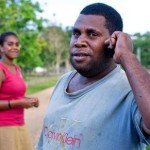[Guest post by Sahiba Minhas cross-posted from engageSpark with permission]
Currently, there are as many mobile-cellular subscriptions in the world as there are people, with more than half of the users in the Asia-Pacific region – 3.5 billion of the 6.8 billion total subscriptions (ICT Facts and Figures by International Telecommunication Union ITU). This does not necessarily mean that every person in this world has a mobile phone or that every region has a cellular network. The increase is attributed to the fact that a single user may have more than one device and/or cellular subscription. The study by ITU also points out that the mobile-cellular penetration rate is at 96% in the world; 128% in developed countries, and 89% in developing countries.
[caption id="attachment_13759" align="alignright" width="150"] photo by Graham Crumb from ImageCity[/caption]
These high rates of mobile usage have caused an explosion of mobile technology programs focusing on improving people’s lives. In our previous blog posts, we have discussed the use of mobile technology in health programs, also known as m-Health; m-Agriculture, as well as its role in empowering women in developing countries, also called mWomen programs. Today’s post delves into how mobile communications are being used by governments to better communicate with the public and address governance issues, including corruption.
photo by Graham Crumb from ImageCity[/caption]
These high rates of mobile usage have caused an explosion of mobile technology programs focusing on improving people’s lives. In our previous blog posts, we have discussed the use of mobile technology in health programs, also known as m-Health; m-Agriculture, as well as its role in empowering women in developing countries, also called mWomen programs. Today’s post delves into how mobile communications are being used by governments to better communicate with the public and address governance issues, including corruption.
 photo by Graham Crumb from ImageCity[/caption]
These high rates of mobile usage have caused an explosion of mobile technology programs focusing on improving people’s lives. In our previous blog posts, we have discussed the use of mobile technology in health programs, also known as m-Health; m-Agriculture, as well as its role in empowering women in developing countries, also called mWomen programs. Today’s post delves into how mobile communications are being used by governments to better communicate with the public and address governance issues, including corruption.
photo by Graham Crumb from ImageCity[/caption]
These high rates of mobile usage have caused an explosion of mobile technology programs focusing on improving people’s lives. In our previous blog posts, we have discussed the use of mobile technology in health programs, also known as m-Health; m-Agriculture, as well as its role in empowering women in developing countries, also called mWomen programs. Today’s post delves into how mobile communications are being used by governments to better communicate with the public and address governance issues, including corruption.
Let’s Imagine a Perfect World with Good Governance
To begin with, let’s imagine a perfect world where interaction between yourself, a common citizen, and the governing bodies (public and private) is only a click away, when:- A person walking down the road in a big city notices a pile of garbage and a chocked drain breeding mosquitoes – he/she types a short message to the local civic authorities mentioning the situation, its location, hits ‘send’ and the issue is dealt with;
- A farmer receives regular weather alerts on his/her phone that allows them to make crucial decisions and act accordingly days in advance;
- A pregnant mother in a remote Ugandan village is provided with health-care tips and with timely notifications to get her regular check-ups based on her term, in an area where access to such information is minimal, if not lacking;
- The phone provides a quick and easy way to be registered as a voter; And countless more scenarios where we, the people, are able to decide, take action, report, demand information and exercise our rights to know and to participate in areas that directly affect our lives.
- Improves governance related services – public administration, information and news related to the government, electoral processes (voter registration etc.) and response to disaster and crises situations – all can be done in an easy, quick way. Mobile governance is seen as a complement to e-governance.
- Helps fight corruption through increased civic participation and promotes transparency and accountability – for example, SMS-based services in almost half of the cabinet agencies in the Philippines allows the public to receive information, comment, file grievances and so on, as well as in China where mobile owners can now send an SMS to the deputies of the National People’s Congress (Kailasam, 2011)
Existing Mobile Governance Programs Around the World
Below are some examples of how mobile communication is being used to promote effective and good governance programs as well as fight corruption:- Georgia: Transparency International launched an open online platform called Fix My Street that allows users to map problems affecting their respective streets in Tbilisi, the capital, by uploading pictures and describing the problem. The issues are notified to the Tbilisi City Hall, which then works to resolve the reports, thereby improving civic governance. While the service does not necessarily report issues of corruption, it does provide an open platform for citizens to connect with public administration in an easy and quick manner.
- Philippines: During the Presidential elections in 2010, the VoteReportPH project encouraged citizens to report issues of vote rigging and other irregularities via SMS, social media, email, and the organization’s website, which used the Ushahidi-based platform.
- Ghana: During elections of December 2012, the Coalition for Domestic Election Observers (CODEO) and the Ghana Centre for Democratic Development (CDD-Ghana) carried an independent vote count, also known as parallel vote tabulation (PVT) by deploying around 4,000 independent observers at polling stations. The observers made records of voting conduct and sent information of voter tallies by SMS to a central location. The process of PVT allowed CODEO to verify the election results.